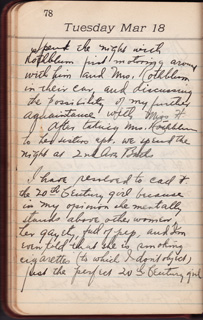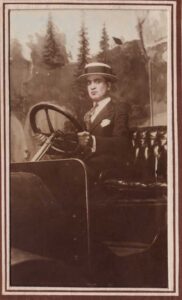
Spent the night with
Rothblum first motoring around
with him and Mrs. Rothblum
in their car, and discussing
the possibility of my further
aquaintance with Miss. H.
After taking Mrs. Rothblum
to her sisters apt. we spent the
night at 2nd Ave Baths
I have resolved to call H.
the 20th Century girl because
in my opinion she mentally
stands above other women
her gayety, full of pep, and I’m
even told that she is smoking
cigarettes (to which I don’t object)
just the perfect 20th Century girl
—————–
Matt’s Notes
The roller coaster ride called “The 2oth Century Girl” continues. On day one, Papa is sure he’s met the girl of his dreams; on day two, seized by pessimism, he literally says “I’m not worthy” and reprimands himself for his folly; on day three, in a scene that could be from a Jewish version of The Great Gatsby, we find him back in the game, “motoring around” and taking a steam bath with the friends who’ll help him plot his next move.
He’s rebounded quite energetically from the previous day’s funk, and in the process has given us another great look at the texture of life in his New York. When he says he motored around in a car, he likely means something like a Model T Ford or a Chevy touring sedan:


My friend Sixto, the highest car authority I know, says there were “hundreds of thousands” of these cars on the road by the 1920’s, and even wage earners like Papa’s friends could have picked one up for very little money. (There were also “a lot of car builders in Manhattan and Brooklyn,” but odds are Rothblum owned a Model T, especially since Henry Ford’s antisemitism wasn’t so well-known yet and wouldn’t have dissuaded a Jewish activist from buying his products.) Sixto also says:
The model T was incredibly sturdy as it was
built to run on crappy rural roads (many, if not most,
unpaved) and share the road with horses on cobble
stoned streets…
The driver of that car drove the car with a huge
steering wheel, and he most likely worked the fuel
from a lever on the steering wheel, while shifting AND
adjusting the timing of the ignition as required
(another lever on the steering wheel). THAT was real
driving.
I don’t have any pictures of Papa driving, but I do have this studio photo of him posing in a prop car with a “huge steering wheel”:


I can picture Papa discussing the “20th Century girl’s” non-objectionable tobacco habit at the Second Avenue Baths, obviously one of the many “schvitzes,” or Russian bath houses, that used to be common in New York. (“Schvitz” literally means “sweat” in Yiddish, and it can be used either as a verb, as in “I’m schvitzing from the heat already,” as a noun to refer to a bath house itself, as in “get me to the schvitz on time” or as a reference to the act of taking a steam bath, as in “I can’t think straight without a schvitz“.)
The only schvitz I’ve even been to is the Tenth Street Baths between First Avenue and Avenue A, and as far as I can tell the overall experience hasn’t changed in a thousand years (except for some coed schvitzing on select nights). The intrepid schvitzer can choose from a Turkish-style steam room, which doesn’t seem very popular, or a dry heat room, which is always full of betoweled men sitting on stone risers that appear to have been carved by ancient peoples from the very bedrock of Manhattan. For a couple of dollars extra, a large person will rub mineral-infused, soapy water on you with a leafy tree branch, and your friends will question your manhood if you don’t take a couple of dips in the icy pool right outside the sauna. This is apparently good for your circulation, which is important if you’re going to avail yourself of the steak-heavy menu in the restaurant upstairs. I usually only take a schvitz before a major milestone, as I did before my wedding, but in Papa’s day it was a much more casual diversion, and certainly an appropriate environment in which to discuss dating strategies.
Update 4/7:
Reader Dina points out the existence of an 1895 comic operetta by Ludwig Englander called “The 20th Century Girl.” Here are the details according to a site called musicaltheaterguide.com:
The 20th Century Girl; comic opera; 3 acts; libretto by Sydney Rosenfeld; Bijou Theatre, New York; 25 January 1895; revised and reopened 6 May 1895 (total 43 perfs)
And here’s a New York Times humor piece from 1912 that uses the same expression (subscription required). Looks like it was, not surprisingly, a common expression.
—————
























